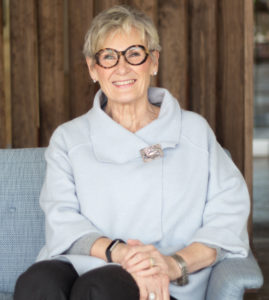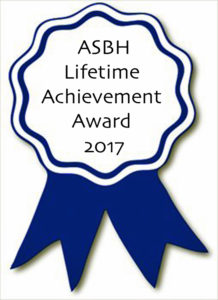bioethics.net is proud to present this live release of the talks given by the 2017 ASBH Lifetime Achievement Award honorees. If you are at the ASBH Meeting, you can read along; if you were unable to attend, then you can see their talks here. Please join us in congratulating these luminaries who have contributed significantly to the field of bioethics.
ASBH Lifetime Achievement Award-2017
Bioethics and an Ethics of Solidarity
Myra Christopher
Kathleen M. Foley Chair Pain and Palliative Care, Center for Practical Bioethics
Director of PAINS (Pain Action Alliance to Implement a National Strategy)

When Amy Haddad told me that I would receive this award, I told her that I was honored and stunned. I think I even asked her if she was sure that she had called the right number. Later when I learned that Steven Miles would also receive this award and that I would share this time with him, I was truly humbled.
The Center for Practical Bioethics, where I have been for 33 years, was founded by three people: a physician, a philosopher and a healthcare attorney (Mary Beth Blake who is with us today.) At that time, the philosopher, Hans Uffelman, had been my teacher and mentor for 7 years. Raised in Nazi Germany and a member of Hitler’s Youth Corp, he came to the US shortly after WWII. I met Hans when, I returned to school to find a place and support for thinking through events that occurred over a two-year period as my mother died in our home of a rare cancer — the year before Florence Wald started the first hospice in the United States.
During my mother’s illness, I was astonished by our experiences in both academic and community hospitals – institutions which seemed to me all but hostile toward patients, their families and even those who worked in them. I simply could not understand why a policy barred my children from visiting their grandmother in the ICU, why a resident would be reprimanded for sitting on the side of the bed and holding my mother after she learned that her cancer had returned and dissolving into tears or why a physician would tell me that he would not be part of killing my mother even if I chose to by taking her from the hospital AMA to get a popsicle on a beautiful spring day. We fought the “system” and honored my mother’s wishes, but it was not easy.
At my mother’s graveside, I promised myself that I would spend the rest of my life working to help people who were seriously ill and dying and their families to have the kind of positive experience that my family had as we lost a beloved mother, mother-in-law and grandmother.
I will never forget my first day in Han’s Ethics 101 class. He began with a case-study about a 28 y/o married white male diagnosed with stage 3 lymphoma. The patient’s wife insisted that her husband be told his diagnosis; his parents told the physician that under no circumstances was he to tell their son this dreadful news because it would rob him of the will to fight. As ridiculous as it now sounds, forty years later, this case engaged a classroom of bright young adults and me in an hour-long conversation. In that discussion, Hans told us how a new “movement” called “bioethics” was advocating for patients to be actively engaged in their care. That day I became hooked on bioethics and came to see it as a vehicle for addressing wrongs in our healthcare system.
A few years later, Midwest Bioethics Center – now the Center for Practical Bioethics — was incorporated as a free-standing, community-based bioethics center in Kansas City. I jumped at the chance to be the full-time volunteer director. Although my role at the Center has changed over the years, and we changed our name more than a decade ago to the Center for Practical Bioethics, the mission never changed – it is to raise and respond to ethical issues in health and healthcare.
I had been educated, socialized and indoctrinated by a philosopher who regularly said, if you are not working toward a more just and humane society, you are no “doing ethics”; you may be writing about ethics, teaching ethics, but without action to make society better for all, you are never “doing ethics.”
The Center for Practical Bioethics has provided me the perfect venue for doing ethics and the opportunity to meet and work with people like those who have been honored with this award in the past and many in this room.
Although I have cherished friendships with many of you and others in the field, I have always felt like an outsider. I have often spoken of my dismay that bioethics has focused on the medically and scientifically exotic sometimes bizarre but rarely shown interest in those people Steve referred to as “invisible” or in the approach we came to call “practical bioethics.” As Carlos Gomez from Virginia Commonwealth University School of Medicine said to me shortly before his death, “Your work is where the ‘rubber meets the sky’.”
The approach we have taken has enabled us to address real life issues, in real time and to make a difference in the lives of many Americans, especially those struggling to live with advanced illness and those who have traditionally been marginalized by our healthcare system.
 Healthcare in our country is a mess. If those in this room and the organizations you represent don’t speak out for change that preserves the traditional values of medicine, i.e., compassion, respect, justice and community, who will? On more than one occasion, my colleagues and I have wrestled with whether to take on an issue? Was it really an ethics issue? Was it really within our mission and our scope of work? On those occasions, I have often asked, “What if we are the ones we have prayed for?” “Who else could do this?” It is time for all of us in this room to ask ourselves and this association, what are our duties and obligations during this time of turmoil?
Healthcare in our country is a mess. If those in this room and the organizations you represent don’t speak out for change that preserves the traditional values of medicine, i.e., compassion, respect, justice and community, who will? On more than one occasion, my colleagues and I have wrestled with whether to take on an issue? Was it really an ethics issue? Was it really within our mission and our scope of work? On those occasions, I have often asked, “What if we are the ones we have prayed for?” “Who else could do this?” It is time for all of us in this room to ask ourselves and this association, what are our duties and obligations during this time of turmoil?
In my view Dr. Seuss may be the great American philosopher. The year his book, The Places You Will Go, was published, a friend sent me a copy and said, “This book reminded me of you and the work you are doing at the Center.”
I have kept a copy on my bookshelf for more than 25 years and refer to it often. If you have not read it, I encourage you to do so. From its simple wisdom, I hope you will find the courage to speak out about issues we are facing in healthcare today.
Let me close with my favorite passage from The Places You Will Go which I think is appropriate for this occasion, especially for those of you who may think bioethics should be more expansive and use its inherent power for the common good.
You’ll get mixed up, of course,
As you already know.
You’ll get mixed up
With many strange birds as you go.
So be sure when you step.
Step with care and great tact
And remember that life’s
A great balancing act
Just never forget to be dexterous and deft
And never mix up your right foot with your left
And will you succeed?
Yes! You will indeed!
(98 and ¾ percent guaranteed.)
These are unprecedentedly challenging times for our country, especially with regard to healthcare policy and reform. Leadership and courage are essential, and in my view, there are no better people than those of you in this room to help us through this morass. Please engage; work with others outside your field – those in your community, state legislature and federal agencies. If you do, “Yes, you will succeed. Yes! You will indeed!”
Thank you for this remarkable honor and the work you do.